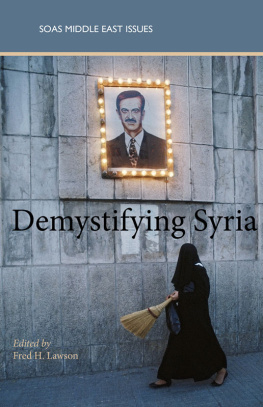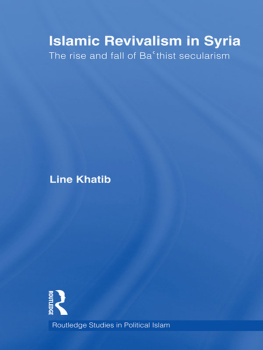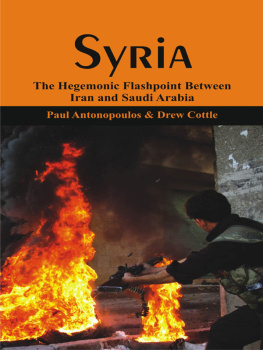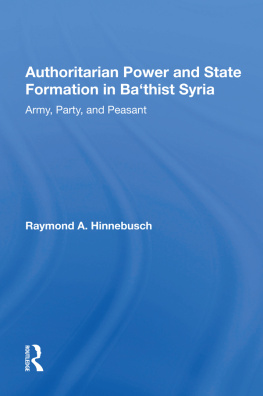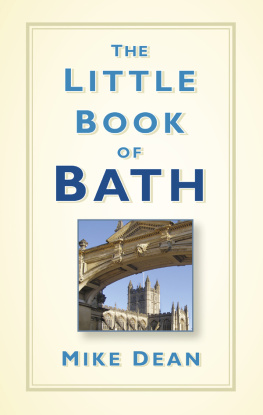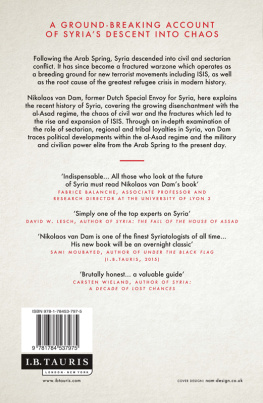ROUTLEDGE LIBRARY EDITIONS:
SYRIA
Volume 1
THE BATH AND THE CREATION OF
MODERN SYRIA
THE BATH AND THE CREATION OF MODERN SYRIA
DAVID ROBERTS
First published in 1987
This edition first published in 2014 by Routledge
Published 2015 by Routledge
2 Park Square, Milton Park, Abingdon, Oxon OX14 4RN
and by Routledge
711 Third Avenue, New York, NY 10017 USA
Routledge is an imprint of the Taylor & Francis Group, an informa business
1987 David Roberts
All rights reserved. No part of this book may be reprinted or reproduced or utilised in any form or by any electronic, mechanical, or other means, now known or hereafter invented, including photocopying and recording, or in any information storage or retrieval system, without permission in writing from the publishers.
Trademark notice: Product or corporate names may be trademarks or registered trademarks, and are used only for identification and explanation without intent to infringe.
British Library Cataloguing in Publication Data
A catalogue record for this book is available from the British Library
ISBN: 978-0-415-83882-5 (Set)
eISBN: 978-0-203-77927-9 (Set)
ISBN: 978-0-415-73496-7 (Volume 1)
eISBN: 978-1-315-81899-3 (Volume 1)
Publishers Note
The publisher has gone to great lengths to ensure the quality of this reprint but points out that some imperfections in the original copies may be apparent.
Disclaimer
The publisher has made every effort to trace copyright holders and would welcome correspondence from those they have been unable to trace.
THE BATH AND THE CREATION OF MODERN SYRIA
DAVID ROBERTS
1987 David Roberts
Croom Helm Ltd, Provident House, Burrell Row, Beckenham, Kent BR3 1AT
Croom Helm Australia, 4450 Waterloo Road, North Ryde, 2113, New South Wales
British Library Cataloguing in Publication Data
Roberts, David
The Bath and the Creation of Modern Syria
1. Bath History
I. Title
322.42095691 JQ1825.S873B3
ISBN 0-7099-4227-3
Printed and bound in Great Britain by Mackays of Chatham Ltd, Kent
Contents
To Hazel, who did most of the work, with love.
I began to study the Syrian Bath when I first went to Damascus in 1963, to be Head of Chancery in the British Embassy there. It was just after the coup dtat of 8 March 1963 which had brought the Bath to office. Ever since then I have thought that a sort of Primer of the Bath in Syria would be useful.
This is not in the least to decry the wealth of existing literature on the subject by Syrians, other Arabs and foreigners. Bathists have theorised extensively and all sorts of learned outsiders have engaged in exegesis, for both of which as a newcomer I can only be grateful. Indeed, it is a tribute to the very depth of their studies that a more elementary work seems to be in order. Its most ardent partisans would hardly claim for Bathism the virtue of simplicity; and the political importance of the subject has provoked so much scholarship that the student is apt to be daunted by the labyrinth at the outset and to deny himself the pleasure of further research and study. I hope to offer him a sound introduction and thereby encourage him to go further.
Moreover, much of the exegesis occurred during what turned out to be a transitional period in a Bathist history. This is all too often the lot of historians. The 1973 Constitution of Syria, enacted after President Hafiz al-Asad had come to power at the end of 1970, has, by the consent of Bathists themselves, crystallised the ideology and the structure. History never stands still, but we have an unprecedented period of some sixteen years of continuity in Syrian and Bathist history, which offers a chance to analyse and sum up.
Accordingly, I have tried to describe the intellectual ancestry of the ideology and to present a light historical framework of events in Syria after the end of the Mandate. There is some discussion of Nasserism; and there are a few passing comments, not very controversial, on important actions and decisions. There is no attempt to analyse major developments in the Arab world. In brief, it is intended to be a simple kind of histoire unementielle. Within that framework I have set an analysis of Bathism, based on primary Bathist documents for whose canonical authority there seems to be a strong evidence. I have followed this with an account of events since President Hafiz al-Asad came to power; and finally I have peered into the by no means clear future. There is no detailed study of the Bath in Iraq and elsewhere, but there is a factual and chronological appendix on the Iraqi Bath.
I have included personal experiences of events which occurred when I was Head of Chancery in Damascus (19636), HM Ambassador in Damascus (19736) and HM Ambassador in Beirut (19813). In political studies this invites the dread accusation of being anecdotal. First, however, personal experience inevitably colours my views; and it is more honest and useful to present that experience such as it was. Secondly, I plead guilty to an obstinate belief that what we see and hear is no less valuable than a priori deductions from theory and the display of statistics. The reader must judge for himself.
As a by-product of this method, however, there is one penalty. Occasionally there is some evidence, mostly but not all verbal, which I have been unable to attribute to the source by name in the normal way. The Bath Party is very secretive and liable to penalise anyone, member or non-member, who describes, or even discusses, party decisions, events or organisation. I have felt bound to respect confidences and must ask the reader to bear with me. I have tried to state quite clearly when this has occurred; and at no point is evidence of this sort crucial to the argument. It merely supports arguments which have already been developed on other grounds.
I have used my own translation of Arabic sources where no authoritative version is available and have in such cases preferred a literal rendering to an elegant paraphrase. Arabic names and expressions have been given in generally accepted transliteration, without any claim to authority in this disputed field.
There is a special difficulty over various Arabic words which could be translated as National, compounded by the Bathist tendency to describe nation-states as Regions. In all references to Bathist leadership and organisation I have translated qawmi as Pan-Arab, i.e. transcending the bounds of nation-states, and qutri as Regional, i.e. restricted to one nation-state (usually Syria).
Throughout this book I have expressed only personal views and not, unless by coincidence, views held officially by Her Majestys Government now or in the past. Nor are those who have so kindly helped me responsible in the smallest degree for the opinions and errors in this book, which are entirely my own.
I owe a deep debt of gratitude to Durham University, particularly the Centre for Middle Eastern and Islamic Studies. Many people there have given us their kindness, hospitality, help, facilities and criticism; and I have learned in the most pleasant way possible what a privilege it is to be an Honorary Fellow of the Centre. They are too numerous to be thanked by name, but I must record that Peter Sluglett has read the whole work in draft and made detailed suggestions. He is on no account to be held responsible for the final result.








